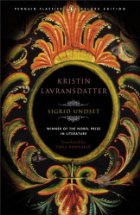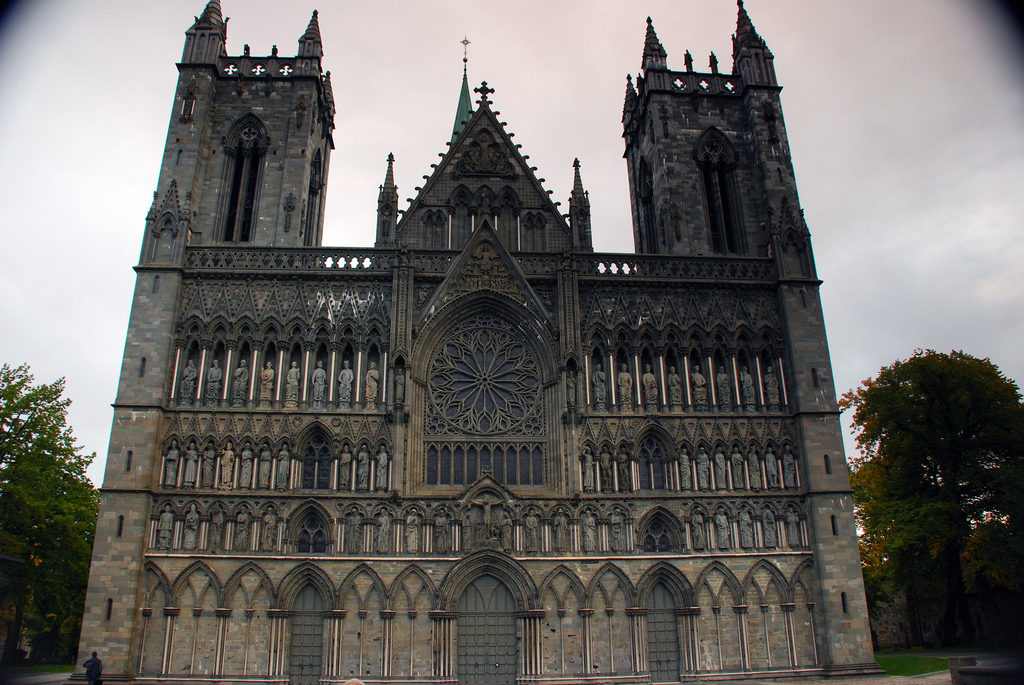
Well, color me confused.
After making my way through the 1100+ pages of Sigrid Undset's Kristin Lavransdatter trilogy, not only am I puzzled about the decision to award this author the 1928 Nobel Prize in Literature, but I am also completely mystified about what seems to be its enduring popular appeal. Because in case you hadn't noticed (and I can understand how you wouldn't, if you were basing your opinion off the responses of our particular readalong participants), this book is BELOVED by many people. It seems to be, for some, not just a good book but one of "those" books: those special, intense journeys that one revisits over the years and by which one is nourished. Check out the Kristin page on GoodReads, for instance: glowing five-star review after glowing five-star review, featuring the warmest of accolades:
- Brilliant and beautiful!
- I only intended to read the first book in this trilogy, and was so "hooked" by that time that I read straight through the entire series.
- This is the best book I've read in a couple of years! It takes place in Norway in the 1300s; the story is compelling and the characters are extremely well developed.
- I would actually give this hefty tome eight stars if the system would let me.
- Fantastic read- truly a classic! I was a bit nervous about how religious it was going to be from the description (I didn't want a lot of preaching) but really it was silly to be worried...
- If you are moved at all by the idea of human nature struggling with both a physical and spiritual identity, or interested by a setting in medieval Norway, I highly recommend it.
- Undset's Kristen Lavransdatter is one of the best books I have ever read.
Sounds great, doesn't it? Good character development, psychological insight, not too religious...I wonder what I just read.
Maybe the most frustrating thing about Kristin Lavransdatter, to me, was that hidden within this behemoth are several novels that I would actually quite like. Whenever life settled down for a moment and the narrative focused less on melodrama and more on everyday medieval Norwegian life, it had a richness and quiet rhythm that I was often just starting to enjoy...when along came Kristin to throw another temper tantrum or angst weepily about what a sinner she was. If the nonstop, over-the-top melodrama of the plot had been muted, and Undset had focused instead on the quiet lives unfolding in the valley, Kristin Lavransdatter could have been a compelling, realistic portrait of rural medieval life.
Or, on the other hand, if the melodramatic plot points had remained but the narrative had been less interior - in other words, if we hadn't been subjected to ENDLESS resentment and self-flagellation on the part of Kristin but instead observed the characters from without, deducing their emotions and motivations from their actions - the story would have resembled a latter-day Icelandic saga. A bit of subtlety in the characterization could only have been a plus, and without the constant need to agonize about sins of the past, the thing would have moved along much more smoothly and perhaps become a taut tale in the adventure/romance vein.
In other words, and I don't say this often, I found Kristin Lavransdatter to be just too damn long. I love a meaty book, but in this case much of the length was comprised of material I felt to be repetitive and/or uncompelling. Do we really need another description of Kristin's tortured weeping? Does it add anything to the whole that Kristin and Erlend are embroiled in yet another pointless battle of the wills? For me, the answer is no: I picked up on the tension between willfulness and religiosity in the first book, and by the end of the third felt like my head was being bludgeoned with it.
There were parts of the novel I did find beautiful and compelling. The last fifty pages, in which the black death arrives in Norway, fascinated me. (Some of you may already know about my weakness for plague narratives, and this was no exception, despite it being a vehicle for a final bout of melodrama.) For once, the upheaval is spread wide across the countryside, rather than festering silently in Kristin's heart, and I thought Undset did a good job imagining the effects of such a catastrophe on the rural medieval Norwegians.
Death and horror and suffering seemed to push people into a world without time. No more than a few weeks had passed, if the days were to be counted, and yet it already seemed as if the world that had existed before the plague and death began wandering naked through the land had disappeared from everyone's memory - the way the coastline sinks away when a ship heads out to sea on a rushing wind. It was as if no living soul dared hold on to the memory that life and the progression of workdays had once seemed close, while death was far away; nor was anyone capable of imagining that things might be that way again, if all human beings did not perish.
Kristin is good in a crisis but bad - very bad - without one. She's what we moderns call a "drama queen": if there's no emergency, she'll create one. So it's understandable that Undset ends her protagonist's life in the midst of a genuine catastrophe. As Kristin herself lies dying, she even has a much looked-for (by me, at least) epiphany that she has loved her life, despite all her trials, and that she has not alienated herself from God after all:
It seemed to her a mystery that she could not comprehend, but she was certain that God had held her firmly in a pact which had been made for her, without her knowing it, from a love that had been poured over her - and in spite of her willfulness, in spite of her melancholy, earthbound heart, some of that love had stayed inside her, had worked on her like sun on the earth, had driven forth a crop that neither the fiercest fire of passion nor its stormiest anger could completely destroy. She had been a servant of God - a stubborn, defiant maid, most often an eye-servant in her payers and unfaithful in her heart, indolent and neglectful, impatient toward admonishments, inconstant in her deeds. And yet He had held her firmly in His service, and under the glittering gold ring a mark had been secretly impressed upon her, showing that she was His servant, owned by the Lord and King who would now come, borne on the consecrated hands ot he priest, to give her release and salvation.
Despite my own agnosticism, I find this passage quite beautiful. It actually reminds me of one of my favorite moments in Virginia Woolf's Mrs. Dalloway, although Woolf was obviously a much more secular, not to mention restrained and subtle, writer. I think a lot of its power comes from listing; I have trouble resisting a good rhetorical list.
But all in all, these last fifty pages were too little, too late. I am too far out of sympathy with Undset's apparent glorification of religious guilt to value slogging through hundreds upon hundreds of pages with a character as selfish and unlikeable as Kristin, particularly when any mitigating rewards - stimulating prose, original characterization, clever plot twists, HUMOR - are so conspicuously absent. I am bemused that a book which seemed to me so tiresome is, for other folks, so transformative...but that's the beauty of literature, isn't it? To each their own.
Check out others' final posts, and join us for Virginia Woolf in January and February! Much thanks to my reluctant co-host Richard for sticking by this lackluster choice of mine, and to all you other lovely readers who chimed in and made this a fun exercise.
- Richard takes Undset to task for her lazy storytelling habits.
- Amy found the repetition in the books annoying, but thought The Cross improved a bit after Erlend's death. She also writes movingly about her personal history with the trilogy.
- Claire is equally unimpressed with The Cross as with the first two books, and is relieved to cross Undset off her list of Nobel winners to be read.
- Gavin, despite having struggled with all the weeping in The Wife, gives the trilogy overall a fairly positive review, citing one of my own favorite passages from the plague section.
- Jill theorizes about why the 1928 Nobel Committee might have awarded the prize to Undset, and concludes that it may have been the easiest choice politically.
- Sarah likens getting to know Kristin to one of those sort-of-fun but totally out-to-lunch friends that you remember later with a rueful shake of your head.
- Softdrink laments the totally unnecessary LENGTH of the trilogy, along with the angst and weeping.
- Valerie sees both good and bad in Undset's trilogy, but thinks its epic length did nothing to improve its quality.
- Wendy gives the trilogy as a whole a positive review, citing Undset's descriptions of the land, and the wealth of detail evoking 14th-century Norwegian life. (Also, because we were a bit out-of-step and I failed to post Wendy's first reviews, here are her thoughts on The Wreath and The Wife. Sorry about that, Wendy!)


